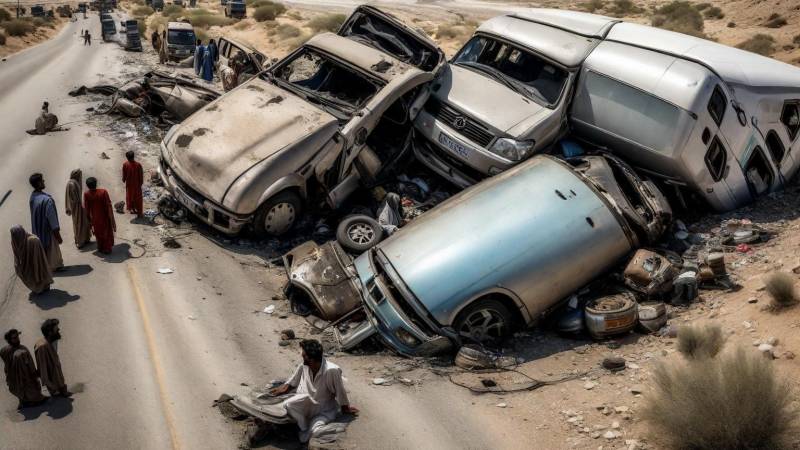
The rugged terrain of Balochistan hides many perils for its inhabitants. There are natural hazards in the form of hill torrents and earthquakes. Then, there are man-made causes, from enforced disappearances and extra-judicial killings to private prisons and deadly tribal feuds. But the Baloch face a greater threat in the shape of road accidents.
According to Ali Sher Jakhrani, a former Deputy Inspector General (DIG) in the Motorway Police in Balochistan, at least 6,000 to 8,000 lives are lost to road accidents in the province every year.
In recent years, we have lost some of Balochistan's brightest brains, whose presence could have made a huge difference in the province in these difficult times. Some of them fell victim to a road accident in Winder on March 9, 2024. The accident resulted in the death of bright youngsters, including Zahir Baloch, Shahab Baloch, Shoaib Baloch, Ahmed Baloch, Sohail Baloch, and Shayhaq Baloch. These stars of the future hailed from Panjgur in Western Balochistan.
Zahir graduated from the Islamia University of Bahawalpur. He was at the forefront when Baloch students faced harassment, curbing of scholarships, and other campus-related issues in southern Punjab. He was always on the front lines. His activism raised a ray of hope among his fellow students to secure their educational and collective interests in Punjab.
On the scholarship issue, the Baloch Council had organised a days-long protest sit-in at the university's main gate in Bahawalpur. They urged varsity authorities not to close the doors of education to young students from Balochistan. For days, they slept on the roads. After many disappointments, harassment and threats, Zahir and his fellow council members convinced the authorities to restore scholarship and address their demands. Throughout the campaign, one would always see Zahir campaigning for the rights of fellow students, irrespective of whether they were Baloch or not.
Had he been alive, you would never have seen him sitting down in a single place but wandering from one corner to another to mobilise the youth or address their issues. He would have worked from dawn to dusk alongside his companions for the Baloch cause
His activism did not end with his graduation. When he returned home in Parom, Panjgur, Zahir worked to restore student politics in his home district. He joined the nationwide student organisation, Baloch Students Action Committee (BSAC) to further the cause of students. He was quickly promoted as the BSAC organiser for Panjgur Zone. He urged students and youth in the wider public domain to gather on a single national platform to amplify their voices on subjects of national interests.
Learning about his demise in a tragic road accident has been the worst shock of the year so far. He was hardly 27 years old and still had a long journey ahead of him to work for the collective interests of Baloch students everywhere. He had contributed what he could to the cause of Baloch students in Bahawalpur as part of the Baloch Council. However, he still had many responsibilities to fulfil on his home soil. Had he been alive, you would never have seen him sitting down in a single place but wandering from one corner to another to mobilise the youth or address their issues. He would have worked from dawn to dusk alongside his companions for the Baloch cause. That is how he had rendered his life to serve his people.
Shahab and others had equally important and strong stances on the Baloch issue.
The day after the accident, an old video went viral on social media where Shahab was delivering a speech at a protest rally organised in Panjgur against the extra-judicial killing of Hayat Baloch in Turbat in 2020. Shahab had feared that many such deaths would follow, including his own, due to the misplaced policies of the state. But dying in a road accident was probably not on Shahab's, nor anyone else's mind. That is how road accidents have become a major contributor to the Baloch genocide.
Whether we should term their deaths as murders is a simple phenomenon for me – and almost everyone else in Balochistan. We have lost far too many people to such accidents. Balochistan has been exploited with several so-called projects, and giving 'gifts' in the shape of deaths to the locals has been the traditional state approach towards Balochistan. On the one hand, enforced disappearances and extra-judicial killings are taking place at great pace; on the other, road accidents are enhancing the number of affected in Balochistan. Amidst all the chaos, the Baloch question their survival.

